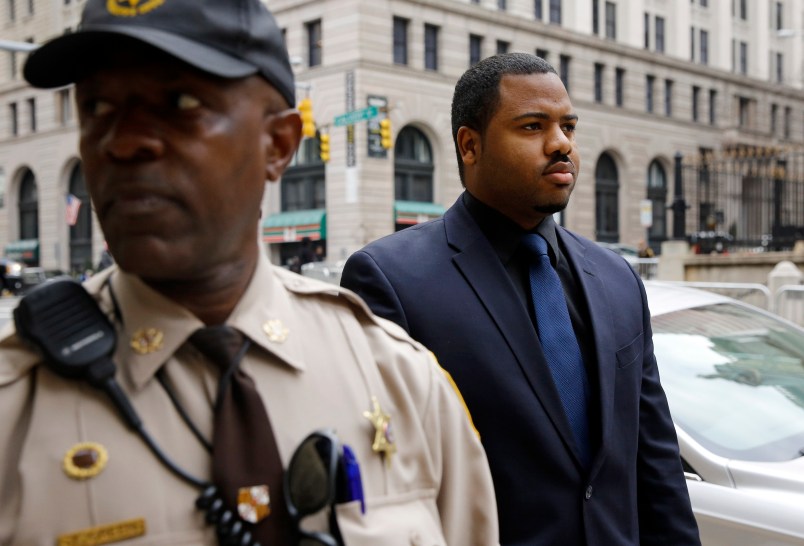Updated 4:35 p.m.
BALTIMORE (AP) — The first trial in the death of Freddie Gray ended in a mistrial Wednesday, with jurors saying they couldn’t determine whether a Baltimore police officer was criminally responsible for the man’s death. Officials appealed for calm in the aftermath of the mistrial, and small crowds of protesters demonstrated along streets lined with police officers.
William Porter’s trial was the first test of prosecutors’ case against six officers in a city struggling to rein in violent crime. The case hinged not on what Porter did, but what prosecutors said he didn’t do. He was accused of failing to get medical help for a critically wounded Gray and was charged with manslaughter, assault, misconduct in office and reckless endangerment. Gray’s injury in police custody sparked weeks of protests and fueled the nation’s scrutiny of how police treat black suspects.
The charges against Porter carried maximum prison terms totaling 25 years. It was not immediately clear whether Porter would be retried. An administrative hearing was scheduled for Thursday to discuss a possible retrial date. Porter waived his right to appear.
Wednesday was the third day of deliberations for the jury of seven women and five men. They deliberated for a total of about 15 hours. On Tuesday, they indicated they were deadlocked, but Circuit Judge Barry Williams told them to keep working.
Since they began deliberating Monday, the jurors made several requests, including one Wednesday for a copy of a transcript from a witness. Williams refused.
“It is clear you will not come to a unanimous agreement on any of the four charges,” Williams told the jurors before declaring a mistrial. Before dismissing them, he said, “You have clearly been diligent.”
During deliberations Wednesday, a handful of protesters gathered outside the courthouse, chanting “send those killer cops to jail.” Upon learning of the mistrial, about 30 people were gathered, and they chanted “No justice, no peace!” and “Black Lives Matter.” The demonstration spilled from the sidewalk and onto the street. Police officers lined the streets.
At least one activist was arrested in the immediate aftermath of the mistrial. Television footage showed Baltimore sheriff’s deputies taking Kwame Rose into custody, putting his arms behind his back and marching him into the courthouse.
Earlier, he told The Associated Press: “This is an injustice, and we are going to fight for justice until it becomes a reality in our lives. A mistrial means that the prosecution did not do their jobs good enough.”
Mayor Stephanie Rawlings-Blake repeated calls for Baltimore residents to respect the trial’s outcome.
“If some choose to demonstrate peacefully to express their opinion, that is their constitutional right. I urge everyone to remember that collectively, our reaction needs to be one of respect for our neighborhoods, and for the residents and businesses of our city,” she said in a statement.
The Baltimore NAACP echoed that call in its own statement, asking for “frustration and anger to be controlled and the rights of all people respected, on all sides.”
After court adjourned, Porter conferred solemnly with defense attorney Joseph Murtha, then walked from the courtroom ahead of his lawyers. A female supporter joined Porter on a bench in a corner of the hallway. Courthouse deputies blocked reporters from approaching them.
Murtha declined to comment, citing a judicial gag order barring lawyers in the case from making public statements.
So did Baltimore City State’s Attorney Marilyn Mosby. “Gag order,” she said, smiling and shaking her head as she waited for a courthouse elevator.
An attorney for Gray’s family, Billy Murphy, said he and Gray’s mother and stepfather would speak about the case at 5 p.m. Wednesday on the courthouse steps. Murphy won a multimillion-dollar settlement for Gray’s relatives before the trial began.
Gray, who was arrested while fleeing from police, died April 19, a week after his neck was broken while the seven-block trip turned into a 45-minute police-van journey around West Baltimore. The autopsy concluded that Gray probably suffered the injury from being slammed against the compartment’s metal wall during cornering or braking.
Gray was black. Porter is also black, as are two of the other five officers charged.
It wasn’t clear how the mistrial would affect the state’s cases against the other officers. Prosecutors had planned to use Porter’s testimony against two of his fellow officers.
Several other recent cases against police officers charged in deadly confrontations with black men have ended similarly. In August, a North Carolina jury deadlocked in the trial of Charlotte-Mecklenburg Officer Randall Kerrick. Prosecutors said they won’t retry the white officer for voluntary manslaughter in the September 2013 shooting death of Jonathan Ferrell, who was unarmed.
In June, a South Carolina jury couldn’t reach a verdict in the retrial of former Eutawville Police Chief Richard Combs, who is white. His lawyer said Combs acted in self-defense in the May 2011 shooting of Bernard Bailey, who was unarmed.
Combs pleaded guilty in September to misconduct in office. He was sentenced to a year of home detention.
Prosecutors in Porter’s trial argued he was criminally negligent for ignoring a Baltimore Police Department policy requiring officers to seat belt prisoners, and for not calling an ambulance immediately after Gray indicated he needed medical help.
Porter, who was driving a patrol car the day Gray was arrested, was present at five of the van’s six stops during its circuitous trip.
The defense said Porter went beyond the call of duty in helping the handcuffed and shackled prisoner move from the floor of the van to a bench in the wagon, and in telling the van driver and a supervisor that Gray said he needed to go to a hospital. The defense mainly cast blame on the van driver, Officer Caesar Goodson, whose trial is scheduled to begin Jan. 6.
___
Associated Press writer Brian Witte contributed.
Copyright 2015 The Associated Press. All rights reserved. This material may not be published, broadcast, rewritten or redistributed.






